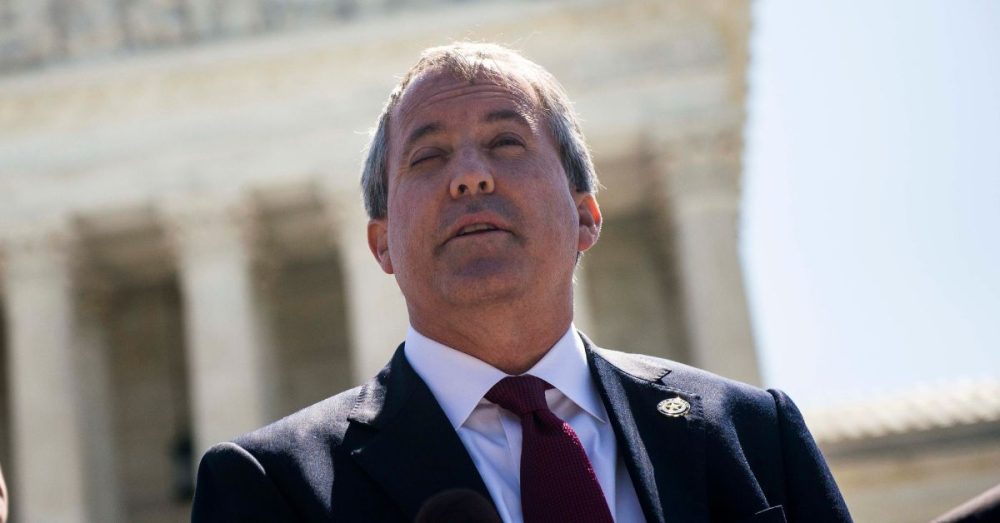(Texas Scorecard) – Texas Attorney General Ken Paxton is taking the unusual step of siding against the Texas Ethics Commission in a case before the U.S. Supreme Court. Rather than defending the state agency, he has filed an amicus brief supporting Michael Quinn Sullivan, a conservative activist who was president of Empower Texans at the time of the events in question.
The case centers on whether Sullivan should have been required to register as a lobbyist before communicating with lawmakers and the public about tax and spending policies.
The dispute dates back to 2014 when the Texas Ethics Commission fined Sullivan $10,000 for allegedly acting as an unregistered lobbyist. The TEC ruled that his efforts to inform legislators and the public—particularly through emails detailing his Fiscal Responsibility Index—qualified as lobbying under Chapter 305 of the Texas Government Code.
Sullivan has spent the past decade fighting the ruling, arguing that the communications were protected free speech, not lobbying. He is now asking the U.S. Supreme Court to review the case.
Paxton, rather than backing the agency tasked with enforcing Texas lobbying laws, is arguing that the TEC’s enforcement is unconstitutional and represents a violation of First Amendment rights.
“No free citizen should have to register with the government and pay a special fee just to send letters or emails to the government about matters of public importance,” Paxton’s brief states, contending that the First Amendment does not allow government officials to regulate political speech in this way.
The attorney general’s filing goes on to suggest that the Ethics Commission’s enforcement is not just improper but harmful to public participation in government.
“Discussing political issues with elected officials is indispensable to democracy,” the brief argues. “In recent years, the Court has repeatedly stressed the importance of robust political discussion.”
Paxton’s brief also challenges the bureaucratic barriers imposed by the state’s lobbying laws, arguing that the TEC’s actions stifle political activism rather than regulate true lobbying.
“Sullivan should not be punished for communicating his views without first registering with the government and paying a fee,” the brief states. “Many people do not have the resources to pay such fees and do not understand the registration requirement; Sullivan’s publicized punishment will discourage the public from sending letters and emails to lawmakers.”
Paxton’s decision to challenge a Texas state agency is rare. While the attorney general’s office typically defends state entities in court, Paxton’s brief emphasizes that he is responsible for protecting constitutional rights above bureaucratic enforcement.
“General Paxton has sworn an oath to ‘preserve, protect, and defend the Constitution and laws of the United States.’ When those obligations conflict, General Paxton may decline to defend a State entity whose actions violate the U.S. Constitution,” the filing states.
At the time of the events in question, Sullivan was president of Empower Texans, a conservative organization focused on fiscal responsibility and government transparency.
As part of that work, Sullivan published the Fiscal Responsibility Index, a rating that graded Texas legislators on their votes related to taxes and spending. The Ethics Commission ruled that his outreach to lawmakers—informing them how their votes would be scored—met the definition of lobbying, making him subject to registration and disclosure laws.
Sullivan and his supporters, meanwhile, have argued that such political communication is core protected speech, not regulated lobbying activity.
Tony McDonald, a free speech attorney who represents Sullivan in the case, sees Paxton’s brief as a warning about broader abuses of power by the TEC.
“This brief should be a strong signal not just to the court, but to anyone who will listen,” McDonald said. “The Texas Ethics Commission is out of control.”
The TEC has faced mounting criticism in recent years for what some say is overreach in its regulation of political speech.
- In Katy Christian Magazine v. The Link Letter, the TEC forced a small publication into a costly legal battle over political advertising disclosures, leading to accusations that the commission’s tactics are designed to intimidate conservative media outlets.
- The agency has also been criticized for targeting citizens. Darnella Wilkerson, an older black activist, was fined thousands of dollars over paperwork issues, effectively shutting down her ability to participate in political organizing.
- Lawmakers have raised concerns that the commission is being used to silence political speech rather than enforce ethical standards. A growing number of Republican legislators have called for reforms to rein in the agency.
If the Supreme Court declines to hear Sullivan’s case, Texas’ ruling would stand, and the TEC’s case seeking to impose fines on Sullivan would continue back in Travis County. That could set a precedent that activists, nonprofit leaders, and even journalists must register as lobbyists before engaging with lawmakers on policy issues.


